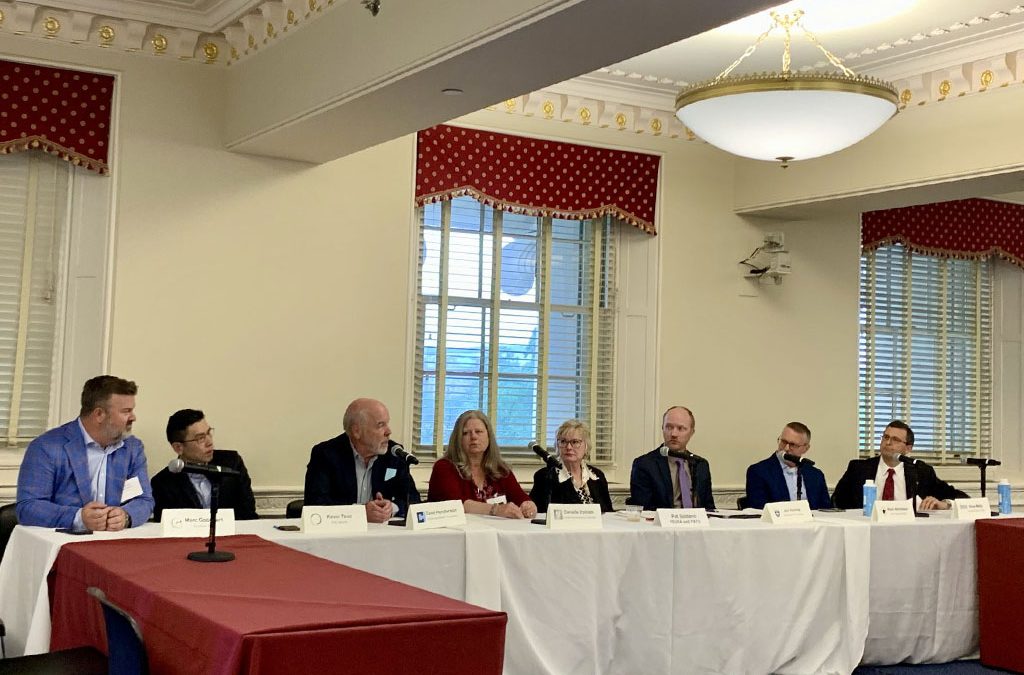Policy Is Moving. Add Your Voice Now.

By Pat Soldano
Founder & President
Policy and Taxation Group
With Focus on ‘Workforce,’ Congressional Family Business Caucus Leaders Hear Directly from Non-Family Business Employees in First Caucus Meeting of 2024
New Family Business Research Unveiled; Shows Taxes, National Debt as Main Concerns This Year
It didn’t take long for the legislators attending this year’s first Congressional Family Business Caucus to get an ear-full of workforce issues facing America’s largest private employer, family businesses.
But this time it was different. The voices were not only from family business owners, but from non-family business employees, too.
The first Caucus meeting was held March 12 in the Longworth House Office Building and the topic was dear to the hearts to those in attendance: workforce.
This bipartisan meeting brought together six Congressional members to speak before family business owners and others in attendance.
The members of Congress who spoke were co-chairs Brad Schneider (D-IL) and Claudia Tenney (R-NY), as well as Rep. John Duarte (R-CA), Rep. Marc Molinaro (R-NY), and Rep. Carol Miller (R-WV). The third co-chair, Rep. Jodey Arrington (R-TX), addressed attendees at the reception after the meeting.
Meetings now have topics tailored to critical issues facing generationally-owned family businesses, and their employees. The next Caucus meetings are set for May 14 and September 18.
To date, the bipartisan Caucus has 42 House members. The expectation is that the number will grow to 50 by the end of the year, considered light-speed progress on Capitol Hill.
Early Research Results
During the meeting, early research from the new Annual Family Business Survey 2024 was presented and, as always, many of the results were a surprise to the Caucus members and Congressional staff members in the room.
The big difference, this time, was the numbers were teamed with the many “real-life” stories from the non-family business employees in attendance.
Highlights from the research, which surveyed nearly 800 family businesses and family offices and centers in 40 states, found that the top three tax policies “of top concern” to family businesses were: 1) Income taxes (41%); 2) Estate taxes (19%); and 3) Payroll taxes (13%). Last year, the number one tax concern was also “Income Taxes,” but the concern was higher at 50%.
The top economic policy priorities family businesses are looking at this year are, at number one, “Reduce the Federal Budget/Debt,” at 30%, and at number two, “Reduce Income Taxes,” at 23%. This is a shift from last year, which had “Reduce Income Taxes” as the number one priority (19%) and “Reduce/Eliminate Estate Taxes” at number two, with 18% of the respondents citing it as the major priority.
When it came to workforce issues, the “Top 3” workforce challenges this year, were: 1) Recruiting & Training (54%); 2) Benefits/Pay (25%); and 3) Culture Building (14%).
When it comes to asking family business owners what they would do “If You Paid Less in Taxes?” The answers, presented to the group, were 52% would “Invest more in their business,” 30% would “Pay more to employees,” and 8% would “Make distributions to owners.”
Real World Work Stories
One real-world story came from non-family member Chris Paz, President at Los Angeles-based Trophy Automotive Dealer Group LLC., who spoke to the group about how unnecessary barriers hurt productivity. Trophy Automotive represents such brands as Mercedes, Kia, and Nissan.
“Every day I see the truly unfair tax burdens and non-market-driven regulations, such as expensive electric vehicle requirements, that are driving small auto dealerships out of business,” Paz told Caucus members and those family business owners, and family office executives in attendance.
Other family businesses in attendance included such organizations as Bush Bros. and Co., Golden Star Technologies, GSM Industrial, Global A1 Flagship Co., Laticrete International, and Nielsen-Massey Vanillas.
Skilled Workers
The biggest workforce issue that came up was finding qualified workers, especially skilled technicians.
Henry Ngo, Senior Vice President at Golden Star Technology in Cerritos, Calif., pleaded his case for the lack of availability of talented professionals.
“The labor laws and immigration policies have a huge impact on our business,” Ngo told the Caucus attendees. “As a business founded by immigrants from Taiwan, there is a huge shortage of skilled professionals in the technology industry,” he said. “We used to rely on trade and vocational schools, but these are gone. We’ve just had to learn how to do more with less.”
Balancing Act
In addressing challenges within the manufacturing sector, lawmakers also heard about deep misunderstandings of the American supply chain and policies that go awry.
“Our biggest concern is dealing with policies that end up with unintended outcomes,” said Ron Nash, President, COO, Laticrete International, North America, based in Bethany, Conn. Laticrete is an international tile installation systems company. Nash is a non-family executive at Laticrete. The stark reality, according to Nash, is “America needs to start inventing again.”
The research and development tax policies “need to be revised so companies can start investing in America,” Nash said. “We no longer are a country or doers and makers, we need to get back to that, back to inventing and investing in America.”
Long-Term Focus
Another non-family employee, Nichole DeGidio, Vice President of Human Resources at Global A1 Flagship, a Navy and Defense Department, contractor based in Orange County, Calif., explained how investing for the long-term creates stability and confidence.
“Working for a family business, I see the real commitment from owners to employees,” said DeGidio. DeGidio has worked for Global A1 Flagship for 16 years.
“It feels like family throughout the entire organization,” she added. “We see how the decisions are made for long-term sustainability and not for short-term profits. Opinions matter in our company and there is a community connection. When we have stability, it creates confidence and that is why we have so many multi-generational, long-term employees,” she said.
Tennessee-based Bush Bros. and Company’s Director of External Affairs, Robert Loggins, a non-family member executive, focused his remarks on attracting Gen Z and Millennials to the workforce.
“We are a rigorous employer in a small town and its tough attracting young people, but we feel this as more of an opportunity than an obstacle once the come and take a look,” said Loggins to attendees. “To keep them interested, we focus on being a great place to work and grow a career over time—and we offer great incentives including giving distributions of over five hundred million dollars to employees over the last twenty-five years.”
Brian Dombach, President of GSM Industrial and a non-family member at the 200-employee industrial services company, echoed the industry wide issue of finding skilled workers.
“Our number one workforce issue is finding welders, technicians, hourly workers, ductwork workers,” Dombach said. “We just can’t find them, it’s something that needs to be address across all industries.”
The next Congressional Family Business Caucus is set for May 14. The topic for that meeting will be “Succession” planning.
We hope you’ve enjoyed this article. While you’re here, we have a small favor to ask…
As we prepare for what promises to be a pivotal year for America, we’re asking you to consider becoming a supporter.
The need for fact-based reporting of issues important to family offices and successful families and protecting a lifetime of savings has never been greater. Now more than ever, family offices and successful families are under fire. That’s why Family Enterprise USA Action is passionately working to increase the awareness of issues important to family offices and successful families, while continuing to strengthen our presence on Capitol Hill.
Family Enterprise USA Action engages with legislators on Capitol Hill on behalf of family offices, successful families, and family-owned businesses. It is focused exclusively on the critical tax and economic policies that impact them. Since 1995, FEUSA Action has been the leading advocacy group working daily in Washington, D.C., to reduce and eliminate estate tax, gift tax, and generation skipping transfer tax while blocking increased income and capital gains taxes, the creation of a wealth tax, and other hostile policies that punish hardworking taxpayers and success in the U.S. It is a bipartisan 501.c4 organization.
#incometax #CapitalGainsTax #R&DExpensing #DontPunishSuccess #GrantorTrusts #likeKindExchanges #AcceleratedDepreciation #EstateTax #Deathtax #wealthtax #taxLegislation #incometaxrates #repealestatetax #FamilyOffice #SuccessfulFamilies @PolicyAndTaxationGroup @DitchTheEstateTax #PolicyAndTaxationGroup #DitchTheEstateTax #FamilyEnterpriseUSAAction

